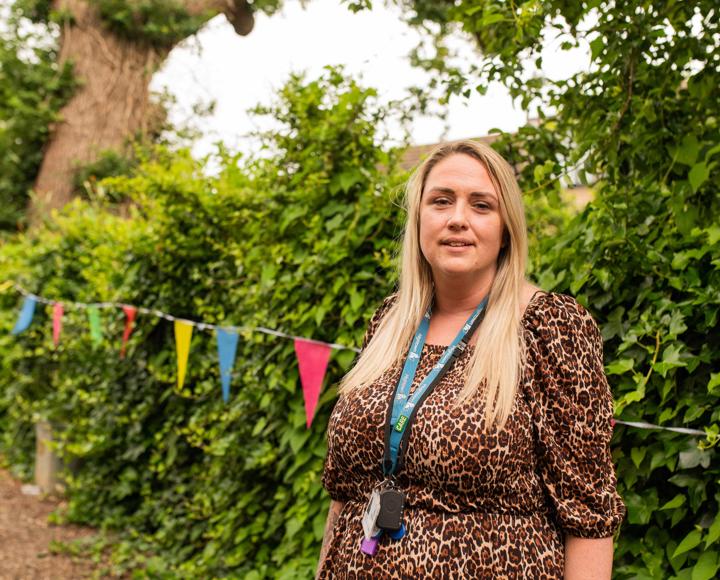To mark this week's Refugee Week (19-25 June), Hightown Operations Manager Dannielle Read explains how the association's supported housing service for separated migrant children (SMC) provides a place to call home for young people who have fled their country of origin to seek safety and arrived in the UK with no parent or guardian.
Who does Hightown's SMC service support?
A considerable proportion of the migrants who arrive in the UK each year are ‘separated migrant children’ (SMC) – young people who reach the UK’s shores alone. According to Home Office figures, there were 5,242 asylum applications from separated migrant children in 2022, up 39% since before the pandemic, making up 7% of total applications last year.
We have three services in Hertfordshire that accommodate and support up to 28 separated migrant children at a time. Currently all our service users are males, however, should the need change and female bed spaces are required, we can look to adapt one of the schemes to female only, as we do not offer mixed gender services due to our service users’ cultural beliefs.
The young people we support are aged 16 and 17 and they can stay with us for a up to 24 months, although the average length of stay is 10-12 months, as a high proportion of young people enter the UK at 17 years old. We occasionally extend a young person’s stay post 18 but only for a maximum of four weeks; the most common reason for this is a lack of available move on accommodation.
In 2022-23 we supported a total of 57 young people, who had fled countries including Sudan, Afghanistan, Syria, Chad, Iran and Iraq to find safety.
Dannielle Read, Hightown Operations Manager, oversees a specialist scheme for separated migrant children
How are young people referred to the service?
Each local authority with a children’s service is part of the UK’s dispersal programme to accommodate separated migrant children – the National Transfer Scheme (NTS) – which was introduced in 2016 and made mandatory in 2021. Local authorities have a 0.1% threshold for SMC referrals, based on their total child population. The referral process is now well-established, so when a separated migrant child spontaneously arrives in a local authority, they can refer them to another authority if they have exceeded their own threshold.
In Hertfordshire, where Hightown’s SMC scheme operates, the county council works with organisations such as ours to ensure that suitable accommodation is provided throughout the whole local authority area. Since Spring 2021, the number of young people accommodate in Hertfordshire has almost doubled, from 80 to 151 by December 2022.
Separated migrant children under 18 are treated as children in need, with the same rights and entitlements as other young people to education, training and employment training opportunities.
Hightown operates three supported housing schemes in Hertfordshire for young asylum seekers
What type of support do you provide?
Many of the young people who are in our services have come from hugely different backgrounds and cultural ‘norms’, so it is important for our support team to help them develop an understanding of the local culture, whilst still embracing their own cultural background. For example, some young people come from a home where they cook their food on open fires with limited cooking appliances – our staff show them how to safely use an oven and hob.
In addition to teaching daily living skills, we also support service users to access education – including ESOL classes – and healthcare, assist them with their Home Office asylum applications and help them with their cultural and wellbeing needs and integration into the local community.
What are the main challenges and barriers separated migrant children must overcome as they start life in the UK?
Many of the young people who arrive with us have endured terrible trauma in their home country, including torture, sexual violence, loved ones killed and homes destroyed, and the impact of these harrowing experiences cannot be underestimated.
Many have taken perilous journeys of up to two years to reach the UK, often living in precarious and hostile situations with no contact with the family from which they have been separated. Some of the young people that come to us seek support from the British Red Cross who help find lost family members – sadly, some never have that contact again. Understandably, growing up without the crucial bond of a family has a detrimental effect on their psychological wellbeing and ability to adjust to life in the UK.
The challenges faced by our service users are not only emotional – there are also many practical difficulties to overcome, including the language barrier. One of the hardest challenges is the lengthy and complicated process of applying for asylum. Almost a third of the young people in our care do not get a decision on their asylum application until after they have turned 18, which means they are unable to access supported accommodation. Whilst these young people are no longer categorised as ‘looked after children’, the local authority still has a duty to house and support them financially whilst their applications are being assessed. This can be quite challenging for some young people, as they must live with the uncertainty.
Each young person joins us with varying needs, so we use a person-centred psychologically informed approach to put the correct support in place. Most importantly, we go the extra mile to build each young person’s trust and are committed to providing a safe, nurturing environment in which they can begin to recover. We have seen the lives of many young people transformed as a result.




